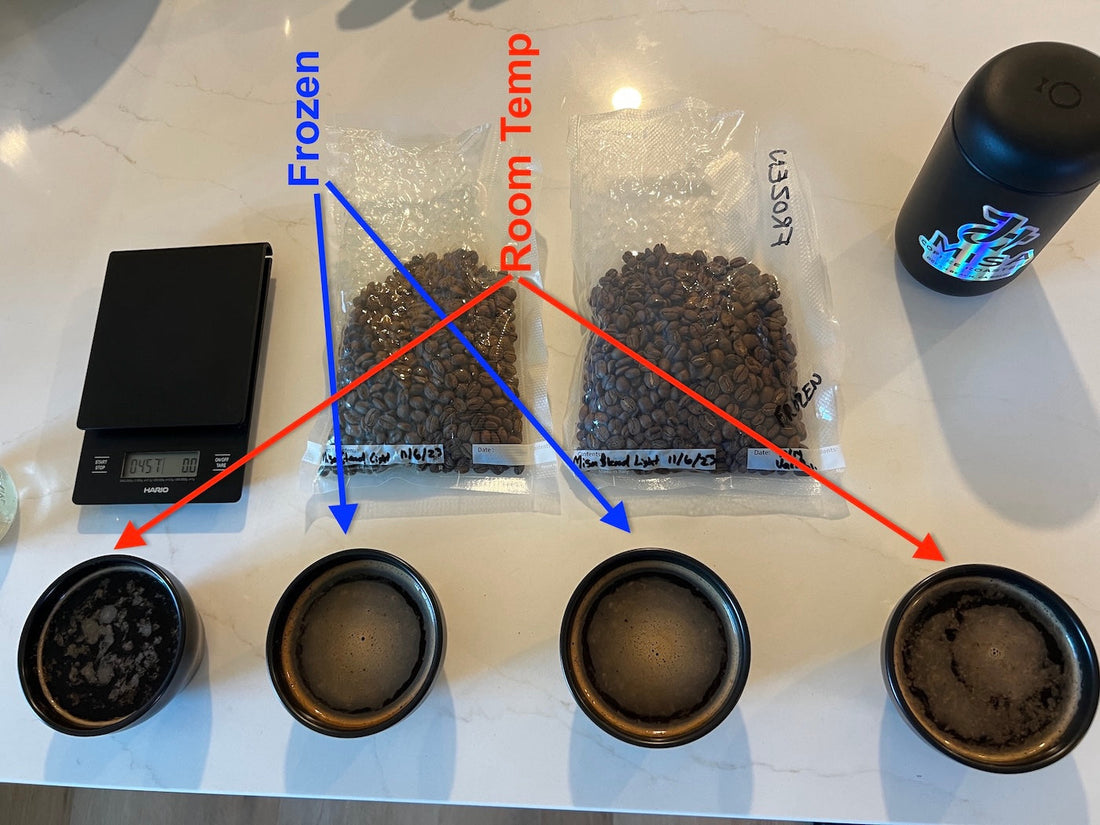
To Freeze or Not to Freeze: Should You Store Coffee in the Freezer?
Share
“Never store coffee in the freezer.” If you've been around specialty coffee for a while, you've probably heard this advice. For years, the idea of freezing beans was seen as a one-way ticket to stale flavor and ruined brews.
But recently, coffee professionals and home brewers alike have started to revisit this claim. As it turns out, freezing—when done correctly—can actually preserve your beans’ freshness for far longer than storing them at room temperature.
So what’s the truth? Should you freeze your coffee beans? Let’s look at the science, the results of a real-world test, and some expert storage tips to help you make the best choice for your cup.
---
The Experiment: Frozen vs. Non-Frozen Coffee
We ran a side-by-side comparison using two bags of our specialty decaf—one stored in the freezer, and one left at room temperature—for three months. We evaluated:
- Pre-cupping aroma
- Crust behavior during cupping
- Ground appearance and oil residue
- Flavor clarity and complexity in the cup
The goal: to see if freezing actually preserves flavor, or just takes up freezer space.

---
Pre-Cupping Aroma
Upon opening the bags, the frozen coffee smelled notably richer and more aromatic. Its profile was sweet and distinct, while the non-frozen bag had a faint, dull scent—what you might expect from older coffee sitting in a pantry.


---
Crust, Grounds, and Oils
In the cupping process, the frozen beans created a more even crust that held in aroma until slightly better—another sign of preserved freshness. The grounds from the frozen beans appeared darker and more vibrant, while the room-temp grounds were flatter in color.
Interestingly, the non-frozen bag showed visible signs of oxidation. Brown oil residue stained the interior of the bag—a common sign of aging and flavor loss.

---
Taste Test: Night and Day
Flavor is what matters most. And in this case, the difference was clear: the frozen coffee had better clarity, balance, and sweetness. Notes of citrus and cocoa came through cleanly. In contrast, the non-frozen sample tasted muted, hollow, and slightly bitter—still drinkable, but uninspiring.

---
Why Freezing Coffee Works
Freezing halts the degradation process by slowing oxidation and moisture loss. Coffee’s enemies—air, heat, moisture, and light—are kept at bay in a sealed, subzero environment.
However, not all freezing is equal. Beans must be stored airtight and ideally portioned out to avoid freezer burn and exposure to condensation during thawing.
NOTE: it should be said that fresh (never frozen) coffee still has more flavor, etc. but in the case that you won't be able to drink all your coffee within a month (and don't want to share with your friends), then the freezer is a good option.
---
✅ How to Freeze Coffee Properly
If you want to preserve your beans for months instead of weeks, here’s how to do it right:
- Use vacuum-sealed or airtight bags or containers
- Freeze in small portions (1-week amounts) to avoid refreezing
- Thaw before opening to prevent condensation
- Grind just before brewing to maintain optimal flavor
This method works especially well for those who rotate between several types of beans or stock up on limited seasonal lots.
---
What About Freezing Ground Coffee?
Freezing whole beans is ideal. Ground coffee loses flavor faster due to its increased surface area. If you must freeze ground coffee, make sure it's in a sealed, low-oxygen container, and avoid keeping it for long-term storage.
---
💡 Bonus Tip: Freeze Decaf for Extra Freshness
Decaf beans tend to fade faster than regular beans due to the chemical and moisture impact of the decaffeination process. That makes decaf a perfect candidate for freezing.
At Frequent Coffee, our decafs are naturally decaffeinated using the Swiss Water Process or Sugarcane (EA) Method, and they hold up beautifully in the freezer.
Explore our decaf collection →
---
So, Should You Freeze Your Coffee?
If you’re buying high-quality beans and want to enjoy them at their peak for longer, freezing can absolutely help. It’s not a one-size-fits-all solution, but when done properly, it can prevent waste, preserve flavor, and save you money by allowing bulk purchases.
Just follow best practices: store airtight, freeze in portions, and grind fresh. You’ll likely be surprised how fresh your beans still taste months later.
---
Your Turn: Have You Tried Freezing Coffee?
We’d love to hear from you! Have you frozen coffee before? Did you notice a flavor difference?
Share your experience in the comments or tag us on Instagram @frequent.coffee with your coffee storage tips or freezer hacks. We may feature your method in our next post!
